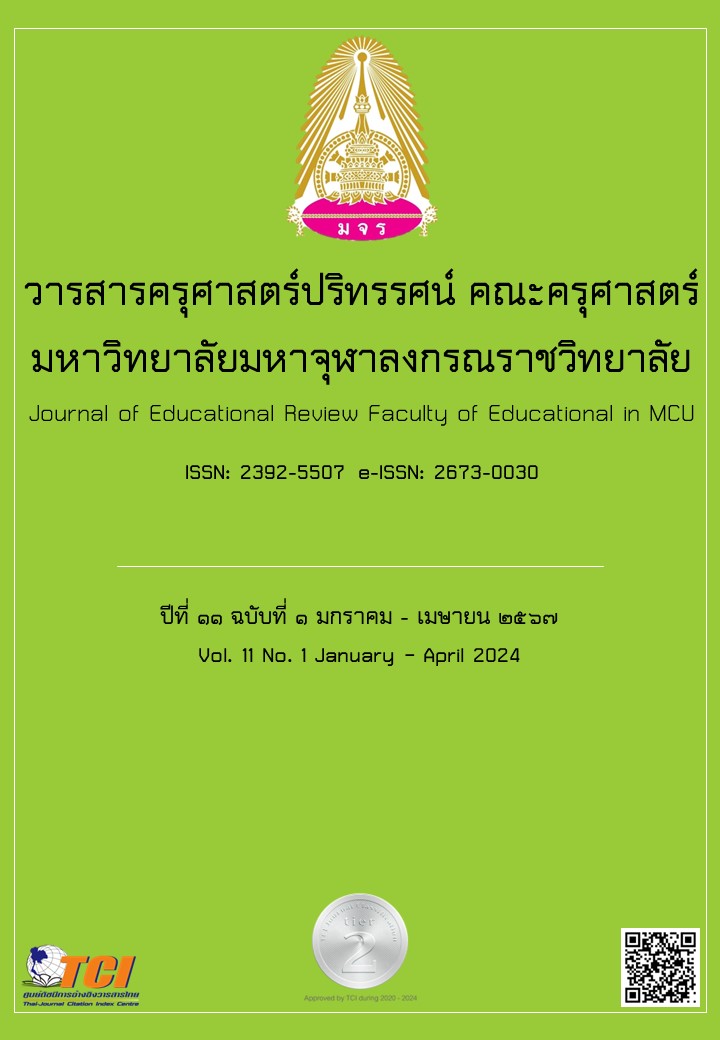THE DEVELOPMENT OF ONLINE LESSON BY USING CASE-BASED LEARNING THAT ENHANCES DIGITAL INTELLIGENCE FOR VOCATIONAL CERTIFICATE STUDENT
Main Article Content
Abstract
The objectives of this research are as follows: 1) To develop the online lessons by using case-based learning for enhances digital intelligence of vocational certificate student to be good quality level. 2) To study the results of enhances digital intelligence of vocational certificate student that are learned with online lessons by using case-based learning. 3) To compare the results of enhances digital intelligence of vocational certificate student that are learned with online lessons by using case-based learning with the criteria of 70 percent. 4) To study the satisfaction of student with online lessons by using case-based learning. The research followed an experimental approach, using the following research tools: 1) Lesson plan 2) Online lessons 3) Case studies 4) Post-test form 5) Quality assessment form 6) Satisfaction questionnaires. The statistics for data analysis, including mean and standard deviation (S.D.) and percentage. The research findings revealed: 1) Online lessons by using case-based learning for enhances digital intelligence of vocational certificate students that evaluated by content expert and media expert were a very good quality. 2) The results of strengthening digital intelligence found that the individual digital intelligence scores are between 70.61 - 81.52 percent, and group digital intelligence scores are between 73.08 - 88.46 percent, passed the standard criteria. 3) The results of comparing students' digital intelligence with the criteria of 70 percent found that the students had an average individual digital intelligence accounting for 74.71 percent and the mean score for each group accounting for 80.23 percent, higher than the standard criteria that the researchers set at the .01 significance level, and 4) Students expressed the highest level of satisfaction with the online lessons by using case-based learning.
Article Details

This work is licensed under a Creative Commons Attribution-NonCommercial-NoDerivatives 4.0 International License.
ทัศนะและความคิดเห็นที่ปรากฏในบทความในวารสารฉบับนี้ถือเป็นความรับผิดชอบของผู้เขียนบทความนั้นเพียงผู้เดียว และไม่ถือเป็นทัศนะและความรับผิดชอบของกองบรรณาธิการ
กองบรรณาธิการขอสงวนสิทธิ์ในการคัดเลือกบทความลงตีพิมพ์และจะแจ้งให้เจ้าของบทความทราบหลังจากผู้ประเมินบทความตรวจอ่านบทความแล้ว
ต้นฉบับที่ได้รับการตีพิมพ์ในวารสารครุศาสตร์ปริทรรศน์ คณะครุศาสตร์ มหาวิทยาลัยมหาจุฬาลงกรณราชวิทยาลัย ถือเป็นกรรมสิทธิ์ของคณะครุศาสตร์ มหาวิทยาลัยมหาจุฬาลงกรณราชวิทยาลัย ห้ามนำข้อความทั้งหมดหรือบางส่วนไปพิมพ์ซ้ำ เว้นเสียแต่ว่าจะได้รับอนุญาตจากมหาวิทยาลัยฯ เป็นลายลักษณ์อักษร
References
เจตินาร์ สายนุ้ย. (2564). การพัฒนาบทเรียนออนไลน์โดยใช้รูปแบบการจัดการเรียนรู้แบบสืบเสาะหาความรู้ 5E ร่วมกับแนวคิดเกมิฟิเคชันเพื่อส่งเสริมความสามารถในการคิดวิเคราะห์ของนักเรียนชั้นมัธยมศึกษาปีที่ 4. วารสารวิชาการและวิจัย มหาวิทยาลัยภาคตะวันออกเฉียงเหนือ. 12(1). 229-243.
ดรุณนภา นาชัยฤทธิ์. (2562). การพัฒนาการเรียนการสอนบนบทเรียนออนไลน์ด้วยเทคนิคการเรียนรู้แบบกรณีศึกษาเพื่อส่งเสริมการคิดแก้ปัญหาของนักศึกษาครู. รายงานวิจัย. มหาวิทยาลัยราชภัฏมหาสารคาม.
ทิศนา แขมมณี (2551). ศาสตร์การสอน องค์ความรู้เพื่อการจัดกระบวนการเรียนรู้ที่มีประสิทธิภาพ. กรุงเทพมหานคร: สำนักพิมพ์แห่งจุฬาลงกรณ์มหาวิทยาลัย.
นิรุตต์ บุตรแสนลี. (2566). การจัดการศึกษาที่มีคุณภาพอย่างทั่วถึง เพื่อการทำงานที่หลากหลายกับการพัฒนาอย่างยั่งยืนในสังคมวิถีใหม่. แหล่งที่มา https://www.facebook.com/pr.vec.fanpage/posts/750097910237047/?paipv=0&eav=AfaFtt6ZBHcJxXw_rHBSew9Hj_MWg1rlh9pVYa4fLZ1C2Bw-b_Ax-a4arLDFuzses10&_rdr สืบค้นเมื่อ 19 ส.ค. 2566.
มธุรส เมืองสุข. (2549). ผลการใช้บทเรียนออนไลน์ เรื่องดนตรีการแสดงในภาคอีสานกับนักศึกษาชั้นปีที่ 1 สาขาวิชาสังคมศึกษา คณะศึกษาศาสตร์ มหาวิทยาลัยขอนแก่น. การศึกษาอิสระศึกษาศาสตรมหาบัณฑิต. มหาวิทยาลัยขอนแก่น.
ราตรี นันทสุคนธ์. (2553). หลักการวัดและประเมินผลการศึกษา. กรุงเทพมหานคร: จุดทอง.
สถาบันการทดสอบทางการศึกษาแห่งชาติ. (2566). ผลการสอบ V-NET ด้วยระบบดิจิทัล ปีการศึกษา 2565. แหล่งที่มา https://www.niets.or.th/uploads/editor/files/การวิเคราะห์เปรียบเทียบ%20V_NET%20ปีการศึกษา%202565-2.pdf สืบค้นเมื่อ 28 ส.ค. 2566.
สยาม ลิขิตเลิศ. (2545). E-learning พร้อมหรือยังกับการศึกษาไทย. เทคโนฯ-ทับแก้ว. 5(7). 96-102.
สำนักงานเลขาธิการสภาการศึกษา. (2562). มาตรฐานการศึกษาของชาติ พ.ศ. 2561. กรุงเทพมหานคร: 21 เซ็นจูรี่.
สุคนธ์ สินธพานนท์ และคณะ. (2550). การจัดกระบวนการเรียนรู้ที่เน้นผู้เรียนเป็นสำคัญ. กรุงเทพมหานคร: อักษรเจริญทัศน์.
สุมนา จันทราช. (2562). การใช้กิจกรรมการเรียนรู้แบบกรณีศึกษากับผลสัมฤทธิ์ทางการศึกษา ของนักศึกษาบริหารธุรกิจ. การประชุมวิชาการ มหาวิทยาลัยเทคโนโลยีรัตนโกสินทร์ ครั้งที่ 4 และการประชุมระดับนานาชาติ มหาวิทยาลัยเทคโนโลยีรัตนโกสินทร์ ครั้งที่ 1 (26-28 มิถุนายน 2562) หัวข้อ การยกระดับงานวิจัยเพื่อขับเคลื่อนเศรษฐกิจและสังคมอย่างยั่งยืน โรงแรมรอยัลริเวอร์ กรุงเทพมหานคร.
DQ Institute. (2020). 2020 Child Online Safety Index. From https://www.dqinstitute.org/wp-content/uploads/2020/02/2020COSIReport.pdf Retrieved August 19, 2022.
Seels, B. & Glasgow, Z. (1998). Making Instructional Design Decision. The United State of America: Merrill Upper Saddle River, NJ.


